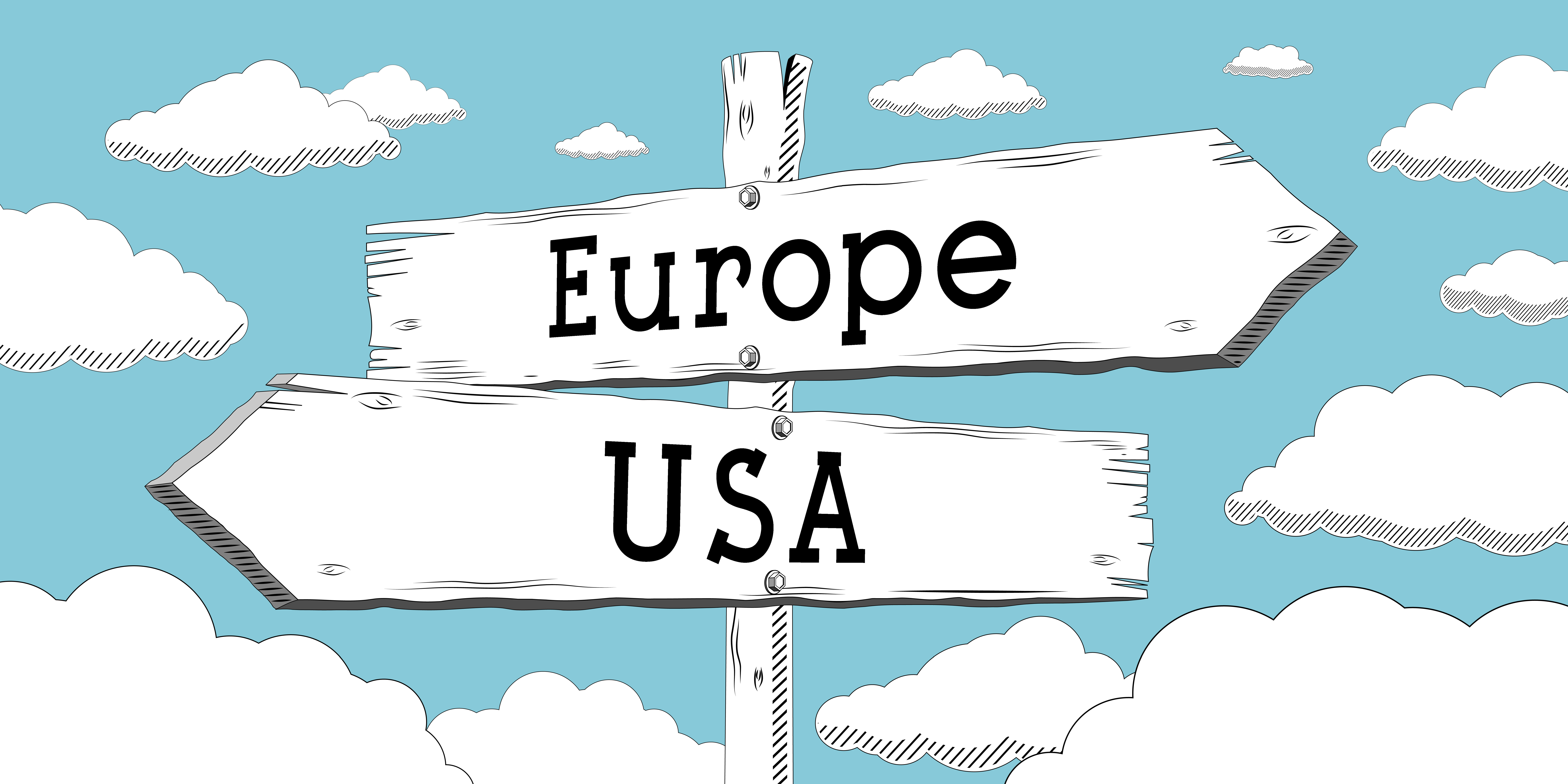NEWS | USA or Europe – Where to Study for My MBA?
Published On: Friday, 3rd Feb 2023

You will do your MBA once, so it’s important to choose an environment that enriches your journey. Ambitious young professionals come to their MBA programme with personalised goals and objectives, so there is no ‘best’ country in which to study. There are pros and cons to both the American and European system, so it’s a case of deciding what’s best for you. Here, we highlight some features of both systems which may help with your decision-making.
The MBA qualification was invented in the USA – it had the institutions in place, the knowledge, passion and the need. It probably suited the existing university platform to have business schools, which did not pre-exist in Europe. With such an august heritage, the USA has developed big brand schools such as Harvard and Stanford, which are known worldwide. While studying at any top business school gives you kudos and enhances your own brand, gaining an MBA from an Ivy League business school adds weight.
When Size Matters
One of the biggest contrasts between European and USA schools is that American schools are usually much bigger. They tend to sit on top of well-established large universities which broaden the learning opportunities. For instance, at Wharton School in Pennsylvania there are some 1,500 courses from which students can choose their elective. This is possible because students have access to the entire law school, medical school, engineering school as well as the business school. Imagine you wanted to specialise in micro-electronic biomedicine because you saw an business opportunity in that area; you could specialise in something that you find intensely interesting and design your own finale! European schools do not typically sit on top of a larger educational system except in name and therefore have much fewer courses from which to choose an elective.
The Faculty
The top business schools all have first-class faculty, but America tends to lead the field, attracting world class authors of business books and published works, because they leverage such an impressive academic base. For example, Philip Kotler, arguably the number one marketing guru in the world, is a lecturer at Kellogg School of Management; Dr Dipak Jain, who is now dean at INSEAD, was previously Dean at Kellogg and Michael E. Porter is affiliated with Harvard.
European faculties are becoming increasingly competitive and have big hitters and famous publications too – Blue Ocean Strategy, probably the most famous business book published in recent years, was written by two INSEAD professors, W. Chan Kim and Renée Mauborgne at The Blue Ocean Strategy institute.
Course Length
USA schools run longer programmes; two years is the norm, though they can be completed in 16 months by working through the summer and some of the modern courses can be shortened further. The advantage of longer courses is breathing space – you have more time to reflect on learning and absorb yourself in projects of special interest. This, of course, is only feasible if your circumstances and resources allow two years study, as programmes in the USA are much more expensive.
European MBA programmes are shorter – INSEAD’s course lasts 10 months, which makes for an extremely intensive period of learning. Undertaking an exercise as costly as an MBA in a shorter time frame is obviously advantageous, but you need to consider if this suits your personal learning style. A longer course is more accommodating to personal growth; based on what you learn you may want to change direction and specialise in a different area. Will a shorter course provide sufficient time for reflection and to evolve? For some people the shorter course will be ideal and studying for two years would not be fast-paced enough or suit their personal circumstances.
International Experience
Gaining international experience is a key component of MBA programmes. The top USA business schools are extremely international, exposing you to a very different environment to normal surroundings and forces you to organise your life accordingly. Studying in Europe (outside the UK), you have the added challenge and benefit of learning a new language. If you choose to study in your home country, you will still be exposed to an international group, as the schools attract students from all over the world (European schools probably have about 60% overseas contingent) but studying overseas gives a more international perspective in business experience and knowledge, you will interact with a larger number of international students and develop a truly international network.
European business schools are becoming more international in their structure – Nottingham University Business School is a good case in point; now it also has campuses in Malaysia and Singapore. Students can start their studies in one location and finish in a different, more exotic environment!
Business School Culture
Choosing the right business school is not only about the academic programme and unrivalled facilities, it’s also about your personality and where you will feel most comfortable and can shine. Here too, there is an important difference between the USA and European schools – it is said that top American business schools produce a highly competitive ‘Type A’ personality environment, filled with similar supercharged people, many of whom aspire to become entrepreneurs in specific fields. By contrast, European schools attract a broader mix of personality types, and it is speculated that they produce a larger number of graduates who move into consultancy careers.
Gaining a place in either a USA or European business school is equally challenging and competitive, so make sure you choose one that fits your personality as well as your academic and career ambitions.
Teaching Styles
Look into the different approaches to teaching. European schools devote much more time to classroom teaching, which is a plus if your personal learning style lends itself to more frequent tutoring. American schools give students more ‘free time’ to pursue areas that interest them. Also, check how assignments must be presented and be clear about the schools’ grading policy (who grades, can grades be challenged, are grades confidential or shared with others, such as recruiters?) – these will differ by country and school. European schools have more international standards such as GAAP (general accepted accounting principles), whereas American schools have their own GAAP. Though, in reality, the content of both are similar.
Alumni and Milkrounds
Finally, compare the differences between the USA and European models beyond the MBA programme itself. Both models have strong alumni organisations and recruitment support but many argue that the American model is unrivalled. American schools have large, very well-funded alumni organisations, and their milk rounds and recruitment assistance are broader and deeper than in European schools. Because American schools are bigger and operate in a much larger economy, every blue-chip company goes to their favourite schools to seek out talent and provide big financial incentives to recruit the candidates they want.

